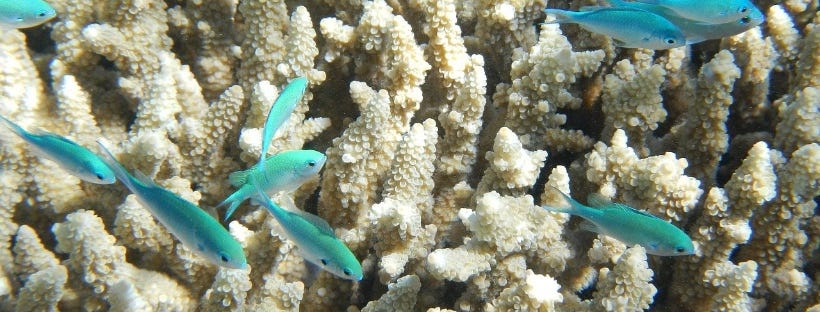Since the 1970s, meteorologists did measurements from the National Weather Service station in Chatham, close to the ocean on beautiful Cape Cod. But while they looked up at their weather balloons, the nearby ocean was changing. Cape Cod's namesake fish population rapidly disappeared about a decade ago. Meanwhile, the sea level rose, and increasingly brutal storms eroded the land between the service station and the coast. On 31 March, the changing climate claimed the weather service station as its next victim. It closed, and the meteorologists made room for a demolition team.
On the same day, on the other side of the planet, a report about Australia's risks of a 3 degrees Celsius warmer world concluded that the Great Barrier Reef is practically lost. The Australian Academy of Science researchers say that it is now virtually impossible to limit global warming to 1.5 degrees Celsius above pre-industrial levels. At that point, between 70 and 99 percent of corals will be dying. That is terrible news for the Great Barrier Reef, the largest living structure on Earth. If temperatures would rise further to 2 degrees, only one percent of the reef could survive.
Australia is a dry continent that is already experiencing warming of 1.4 degrees, while the world's average is about 1.1 degrees. There we see the devastation happening like scientists had predicted for a 1.5 degree warmer world: heatwaves, droughts, bushfires, flooding. We all remember the sad pictures of burning and dying koalas. But what happens underwater isn't breaking news in the world's media. Three coral bleaching events destroyed more than half of hard coral cover in Australia's shallow Barrier Reef waters in the past five years.
If the world's leaders are too slow to halt climate change, we could reach three degrees Celsius (or more) by the end of this century. Scientists predict that the oceans will then absorb five times more heat than in 1970, leading to more frequent and more intense heatwaves and less oxygen at shallower depths. Coastal ecosystems, like coral reefs and mangrove forests, will increasingly suffer from the combination of higher sea levels and fiercer storms. Oceans do not only absorb most of the heat of our warming planet; they also absorb about a third of the CO2 that is emitted to the atmosphere by human activities. It increases the water's acidity; think of the fresh taste of the bubbles in your soda. That is terrible news for many marine life forms, with their shells and skeletons from calcium carbonate. Think of those seashells the next time you clean the hard water deposits in your bathroom with acid.
Marine life is fleeing the equator
It is not only in Australia where the ocean is in deep trouble. We see this worldwide; climate change, plastic pollution, overfishing, mining, the list is much longer. One of the effects is fish moving away from the equator when the waters get too warm for their taste. It used to be that most marine species lived near the equator and much less near the poles. But that pattern has changed now, and scientists are worried. Five years ago, they predicted that this would happen, but now they have evidence, based on nearly 50,000 marine species' distribution patterns. A similar move away from the equator occurred some 252 million years ago, and 90% of species died out. Fish migration parallels human migration because the newcomers are not always welcomed with open arms by the other species. There will be competition, and new predators will hunt for new species.
All these changes will impact humans too. Think of the loss for Australia's tourism industry, with fewer visitors to the Great Barrier Reef. Or the loss of income from fishing for small island states where the fish is no longer in their territorial waters. The scale of the impact of these changes in the ocean is hard to imagine when you realize that, according to the OECD, more than three billion people rely on the ocean for their livelihoods, most of them in developing countries. Ocean-based industries such as tourism and fisheries are often the key sources of income and jobs.
If you like reading The Planet, please subscribe. It takes just half a minute:
Notes:
https://www.theguardian.com/us-news/2021/apr/14/cape-cod-climate-research-station
https://www.oecd.org/ocean/topics/developing-countries-and-the-ocean-economy/









Between 50% to 80% of our oxygen supply comes from the ocean. At what pH do phytoplankton lose their ability to produce the air we breathe? Global warming may be a lot more "existential" than most people realize.
Too many countries are still doing nothing to stop climate change. All the red flags are there from raising sea levels, droughts, severe storms, wildfires, and extreme heat waves. Until governments truly take action it will only continue to get worse. We only have this planet on which to live. Hope governments wake up.